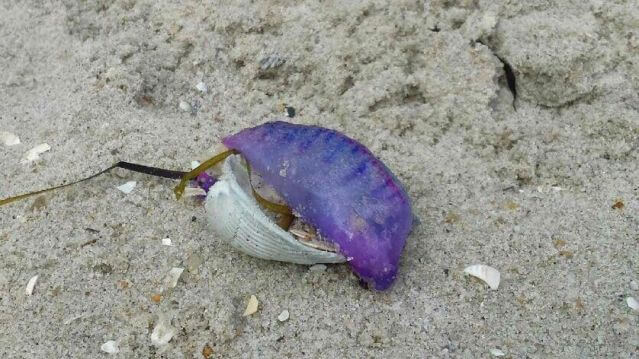A jellyfish that can be extremely dangerous washed up on a Jersey Shore beach on Sunday.
Lifeguards spotted the Portuguese man o’ warjellyfish on Sunday on Long Beach Islandand are nowwarning swimmers to exercise extra caution.
The Harvey Cedars Beach Patrol posted about the spotting on their Facebook on June 21.
“This morning we found a Portuguese man o’ war washed up on the beach,” the patrol posted.
Also known as the “physalia,” “floating terror” or “bluebottle,” a man o’ war’s sting is said to be far more painful than that of a regular jellyfish. “Physalia stings can be lethal, but are more frequently just excruciatingly painful,” saidDr Lisa-Ann Gershwin, director of the Australian Marine Stinger Advisory Services.
The man o’ warhas venomous tentacles thatcan grow to be as long as 30 feet, whichit uses to paralyze and trap ocean prey.
Depending on the person, a man o’ war’s stings can cause extreme pain, fever, shock, lung and heart problems and in rare cases, death, reports say.
But a bigger mystery may be how the tropical jellyfish found its way to New Jersey.
Gershwin says this species is known to travel.
“Physalia can travel immense distances because of the way its sail sticks up out of the water. It literally sails the breezes around the world. Although it is generally associated with the tropics, it does occasionally turn up in far flung places,” she said. A British beach was closed in 2008 after 10 man o’ wars were found in the area.
Rare, dangerous jellyfish washes up on Jersey Shore

Provided
In fact, man o’ wars are divided up into “left-handed” and “right-handed,” she said. This means that breezes will carry just one group at a time, the lefties or righties.
“It’s nature’s way of gaining dispersal while still preserving half the population,” Gershwin said.
No word was yet available on whether more man o’ wars were found or if just one had been found.
A box jellyfish — also an unsual and somewhat dangerous species — was found on the Jersey Shore last summer.































